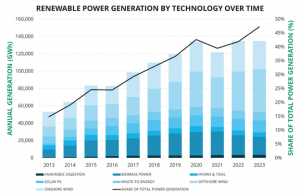The REA has recently launched REview 24, our authoritative annual assessment of the UK’s renewable energy and clean technology sector. This flagship report captures the state of play across the industry and outlines the progress needed to meet critical net zero goals.
To highlight the report’s key findings, we’ll be sharing weekly insights until Christmas, covering our strategic focus areas: Power, Heat, Circular Bioresources, Transport, and Finance.
Each piece will explore the challenges and opportunities within these sectors, starting today with a deep dive into Power and the journey towards a fully decarbonised energy system by 2030.
Racing Towards Clean Power by 2030
As we reflect on the achievements of renewable energy over the past decade, it is clear that the UK has made remarkable progress. Renewables accounted for 47% of electricity generation in 2023, a significant leap from less than 15% in 2013. Offshore wind alone contributed a record-breaking 17% of total generation, and solar power and bioenergy remained vital players. Yet, the findings of our latest report show that progress is not accelerating at the pace required to meet the challenges ahead.
In 2023, despite an increase in renewable generation capacity from 53.5 GW to 56.1 GW, total renewable output remained stable at just under 135,000 GWh. Infrastructure constraints, climatic factors, and market inefficiencies played a key role in limiting growth. While the share of renewables in the electricity mix grew, the sheer scale of deployment needed to fully decarbonise the power system by 2030 still feels like an Olympic-level challenge.

The new Labour Government’s Clean Power Mission is ambitious: to decarbonise the power system within six years. Like Olympic athletes striving for gold, this goal requires dedication, discipline, and strategic planning. Encouragingly, Labour has already made headway by increasing the budget for Contracts for Difference (CfD) auctions, approving large-scale solar projects, and reforming planning rules for onshore wind. These moves are fostering renewed investor confidence.
Yet, these early wins are only the beginning. To reach the finish line by 2030, we must address the critical hurdles outlined in our report:
- Accelerating Grid Reforms: The UK’s ageing transmission and distribution networks remain the biggest barrier to progress. Delayed grid connections are pushing projects beyond 2030, making the establishment of the National Energy System Operator (NESO) in 2024 and the publication of the Strategic Spatial Energy Plan, next year, pivotal. NESO are moving ahead quickly with connection reforms, with two consultations closing this month. All of which will make 2025 a critical year for turbocharging work to unlock the necessary capacity for decentralised and renewable energy generation.
- Stable and Transparent Policy Frameworks: A rolling timetable for CfD auctions, bespoke capital allowances, and clear pathways for bioenergy carbon capture and storage are vital to sustaining investment and momentum. Equally important is ensuring the continuity of generation assets nearing the end of their Renewable Obligation contracts from 2027 onwards.
- Revamping Market Structures: The Review of Electricity Market Arrangements (REMA) must deliver a fair and competitive energy market that rewards clean, flexible, and reliable generation. It must also protect consumers, ensuring energy security is achieved affordably.
- Maximising Every Tool: Sustainable biomass and other underutilised technologies, like Long Duration Energy Storage and Deep Geothermal, remain essential to a diverse and secure energy mix and must be fully integrated into the UK’s decarbonisation plans.
This is a race against time, but it is a race we can win. The renewable energy sector is ready to respond with the laser focus and determination of any athlete striving for gold. The starting gun has been fired, and the finish line—clean power by 2030—is in sight. However, success will require collaboration across the energy ecosystem, from generators and infrastructure developers to policymakers and consumers.
We know the challenges. Now, it’s time to deliver.
Mark Sommerfeld, Head of Power and Flexibility, REA
